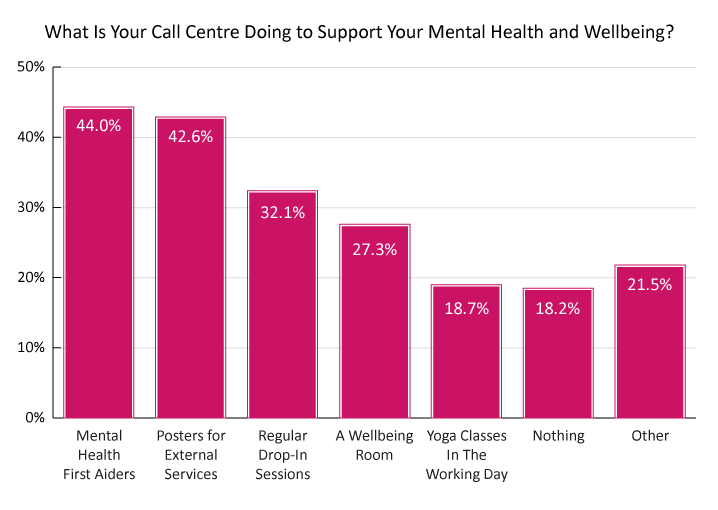How to Create a Nicer Place to Work
Here are 21 ways to improve your contact centre working environment – as practised by the Specsavers team who won a silver award for their colleague support and wellbeing programme at the 2023 UK National Contact Centre Awards:
1. Introduce Wellbeing Advocates
Wellbeing Advocates are staff volunteers who help to promote wellbeing across the contact centre by investing time in looking up cheap family recipes, exploring available discounts, rounding up ideas for free family days out, and so on. All to help promote wellbeing resources that their colleagues might otherwise be unaware of.
Note, for this to be successful, colleagues who opt to be Wellbeing Advocates – on top of their day job – should also be given dedicated time to run this side project within the working week.
Why should this be colleague-led? The Specsavers leadership team have found that these sorts of initiatives have more impact coming direct from the floor, as they have more emotion and connection behind them, compared to when similar initiatives are introduced by HR alone.
For common sources of contact centre stress and how to address them, read our article: Employee Well-Being: How to Reduce Contact Centre Stress
2. Fix Tech Issues to Make Everyone Happier in Their Roles
Unresolved issues with technology and processes can be a source of daily stress for agents.
Focusing on continuous improvement and investing time to address such problems can help to make everyone happier in their day-to-day roles.
3. Address Issues of Loneliness
Sadly, loneliness is a prevalent issue in society and one that contact centres should address to help better support their people – particularly as research has shown that 16–24-year-olds experience loneliness more often and more intensely than any other age group.
What can contact centre leaders do? Ideas span from talking openly about loneliness and sharing podcasts to shed light on the issue, to using icebreaker apps to help connect potentially lonely people across the contact centre who are open to meet up for a 1-to-1 coffee and a chat.

4. Put Public Transport Timetables in the Lobby
A simple way to help agents travelling via public transport is to put live timetables on screens in the lobby.
These can be for buses, trains, or trams – whatever is relevant to your location.
All to help make the end of their shift and getting home that bit easier.
5. Give Managers a Budget for Rewarding Their Teams
Instead of rolling out the same prizes and rewards across the entire contact centre, why not give managers their own personal budget for rewarding their teams?
That way, managers can tailor treats and incentives to things their teams will truly enjoy – whether they use it for snacks or spot prizes, or choose to save it up to reward the team with paid-for team nights out across the year.
6. Focus on the 4 Key Areas of Wellbeing
Championing wellbeing isn’t just about having a fruit bowl in the kitchen.
When addressing wellbeing, contact centres should aspire to putting a wellbeing programme in place that covers these 4 key areas:
- financial
- emotional
- physical and
- mental health
This creates a balanced, longer-term approach to supporting their teams.
7. Don’t Put Bonuses Out of Reach Time After Time
Bonus schemes can quickly become stressful and demotivating if targets are always unrealistic and never achieved.
To counter this, the Specsavers leadership team actively avoid setting unachievable targets that put bonuses out of reach. Instead, they have a quarterly bonus scheme which is quite simply based on agents doing their job well.
8. Be More Approachable
Driving a culture where everyone – even the senior leadership team – is seen as genuinely caring and approachable can make a big difference to the working environment.
Everyone needs to model this behaviour, starting with the little things like saying “hello” and “thank you for your hard work” across the day.
If you looking for advice on how to improve your contact centre culture, read our article: The Importance of Call Centre Culture and How to Improve It
9. Include Healthy Food Options in a Self-Service Canteen
A far cry from a chocolate-filled vending machine, Specsavers HQ has a self-service canteen on-site with a selection of healthy food options for agents to enjoy at a time that suits them.
By listening to staff feedback and taking a proactive approach to continuous improvement, they have also taken steps to make food options more inclusive – with better choices for people who are vegan (for example).
10. Try to Avoid Including AHT Targets in Bonus Schemes
It’s the manager’s job to coach for better AHT, not for the agent to worry about with visible scoring.
Instead of tying KPIs like AHT to bonus targets, try assessing agents on appointments booked, and quality.
The QA team can also support on tone of voice and compliance.
It’s the manager’s job to coach for better AHT, not for the agent to worry about with visible scoring.
11. Cap Manager-to-Agent Ratios for the Best Outcomes
Cap manager-to-agent ratios across all your teams at a 15:1 ratio, so managers have enough time to support each individual team member’s development and wellbeing – and aren’t forced to cut corners due to lack of time.
To discover other team leader to agent ratios and find one that works for you, read our article: What’s the Best Team Leader to Agent Ratio in the Contact Centre?
12. Put Mental Health First Aiders in Place
It’s important to be conscious that your frontline agents are also very likely to be in the demographic of people feeling the most pressure of the cost-of-living crisis right now.
This is where investing in training up Mental Health First Aiders can be a real gamechanger in helping to giving agents emotional support and practical advice ‘in the moment’ to boost their wellbeing.
This is proving to be a popular initiative, as according to Call Centre Helpers’ What Contact Centres Are Doing Right Now (2023 Edition), nearly half of survey respondents (44%) said they had Mental Health First Aiders:

13. Introduce Apps and Services Offering Support
It can also help to sign up to various apps and resources and make them available for your frontline teams.
Here are a few the Specsavers team currently have in place – for inspiration:
- A ‘wecare’ programme that gives agents instant access to services including financial and medical advice.
- A ‘Headspace’ app with instant access to tools like meditation exercises, parenting advice, and general tips for overall wellbeing.
- The ‘T-cup’ app where individuals can log in every day to complete an anonymous survey about how they’re feeling in terms of their hydration and stress levels. This data then gets collected and pushed to managers to help them suggest tasks they can complete to help improve their mood/physical wellbeing.
Note, it’s not enough for the company just to sign up to these resources, you’ve got to remember to regularly signpost people to them too.
14. Have Semi-Regular Shift Reviews
One way to help make your contact centre a nicer place to work is to be flexible and have semi-regular shift reviews, so personal situations can be discussed – for example, where employees might need to factor in the school run.
With an “as long as you get the work done” mindset, you can allow people the flexibility they need, which can be positive for the long-term wellbeing of all colleagues.

15. Don’t Display Any Numbers on Your Wallboards
Managers have found that displaying performance data contributes to anxiety and, as they want their people to focus on customers, they don’t display any data or numbers on their wallboards.
Instead, they display motivating messages, adverts about internal vacancies, positive C-SAT comments and more, for a more positive experience.
16. Stop Monitoring People Too Closely
The Specsavers leadership team have found that people tend to perform better when they’re not being monitored too closely.
Instead, they find that if mental health and wellbeing are prioritized, then productivity naturally follows. There’s less pressure and stress and they avoid an “you’re only as good as your last sale” mindset.
17. Don’t Force People to Engage
You can quickly undo the positive benefits of an app or service if you force people to use it.
Instead, it’s better to take a softer approach with freedom of choice, by saying “here’s this new tool, it’s up to you if you use it”.
Remember, even if one person uses it and it helps them, it’s a positive change.
18. Have Regular Catch-Ups
We all experience wellbeing and mental health challenges, no matter how big or small these personal issues might be.
It’s helpful to keep an open door to mental health conversations by having wellbeing catch-ups throughout the week.
That’s why it’s helpful to keep an open door to mental health conversations by having wellbeing catch-ups throughout the week.
Also let team members know you’re always there if they need to grab a quick 15–20 minutes with you – so they can feel safe at work and trust that their manager will be there for them when they need them.
19. Give Managers Formal Training
Another approach to wellbeing is to give managers formal training about mental health.
When the leadership team is always thinking “how do we better ourselves?”, you can all know that you’re truly doing your best to support your teams.
20. Invest in Two Screens for Everyone
The Specsavers team have invested in everyone having two screens, as it’s easier for frontline teams to complete their daily tasks. It therefore also improves overall productivity.
21. Send Hand-Written Recognition Messages

Take the time to hand-write cards to your frontline teams when you want to truly say “thank you”.
Sometimes the smallest personal touches go the furthest in making people feel more than just a number.
Thanks to John Forster, Head of Contact Centre Operations at Specsavers, for being interviewed for this article.
For more great articles with tops tips on how to improve your contact centre, read these next:
- How to Keep Morale Up in a Short-Staffed Contact Centre
- Top Tips for Improving Your Workforce Engagement Strategy
- 20 Tips for Managing Change in the Contact Centre
Author: Megan Jones
Reviewed by: Jo Robinson
Published On: 3rd Jan 2024 - Last modified: 24th Jan 2024
Read more about - Hints and Tips, Editor's Picks, Employee Engagement, Health, Leadership, Reward and Recognition, Top Story, Well Being



































